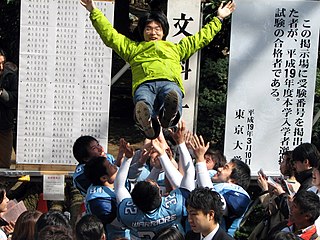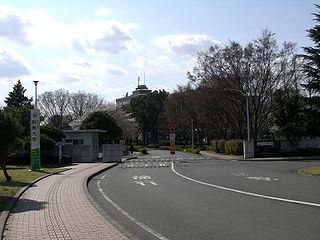
Higher education in Japan is provided at universities, junior colleges, colleges of technology and special training schools and community colleges. Of these four types of institutions, only universities and junior colleges are strictly considered postsecondary education providers. The modern Japanese higher education system has undergone numerous changes since the Meiji period and was largely modeled after Western countries such as Germany, France, Britain, and the United States with traditional Japanese pedagogical elements to create a unique Japanese model to serve its national needs. The Japanese higher education system differs from higher education in most other countries in many significant ways. Key differences include the method of acceptance, which relies almost entirely on one or two tests, as opposed to GPAs or other methods of assessment used in Western countries. Because students only have one chance to take this test each year, there is an enormous amount of pressure to do well on this test, and the majority of senior high school education is dedicated to doing well on this single test.

Education in the Empire of Japan was a high priority for the government, as the leadership of the early Meiji government realized the critical need for universal public education in its drive to modernize and westernize Japan. Overseas missions such as the Iwakura Mission were sent abroad to study the education systems of leading Western countries.
Nagasaki University is a national university of Japan. Its nickname is Chōdai (長大). The main campus is located in Bunkyo-machi, Nagasaki City, Nagasaki Prefecture, Japan.

Kumamoto Gakuen University called Gakuendai (学園大) or Shōdai (商大), is a private Japanese university in Kumamoto, Japan. It was established in 1942, at which time Eastern Language Vocational College was subsumed into it. It was renamed Kumamoto Language Vocational College in 1945, and was made into Kumamoto Commerce University in 1954. It acquired its current name, Kumamoto Gakuen University, in 1994. At present, the university has 4 faculties with 11 departments.
Daigakkō is a word used in names of some post-secondary educational institutions in Japan. Its literal meaning is "Grand School" or "Great School". It came from a literal translation of "Grandes écoles" which is the elite higher institutions in France. This word is translated into "academy", "college" or "university" in their English names, and there is not a settled translation. The National Defense Academy of Japan was established École Polytechnique as its model.

Osaka University of Commerce , abbreviated to Daishōdai (大商大), is a private university located in Higashiosaka City, Osaka Prefecture, Japan.

Nagoya City University , abbreviated to Meishidai (名市大), is a public university in Japan. The main campus (Kawasumi) is located in Mizuho-ku, Nagoya City. Other three campuses are also located in the city. Nagoya City University has been ranked the highest among public universities which is also one of leading universities in Japan.

National University Corporation Tottori University , abbreviated to Toridai (鳥大), is a national university in Japan. The main campus is located in Koyamachō-Minami, Tottori City, Tottori Prefecture. Another campus, the Faculty of Medicine, is located on the Yonago Campus in Yonago, Tottori.

Utsunomiya University is a national university in Japan. The main campus is located in Miné-machi, Utsunomiya, Tochigi Prefecture.

Kyoto Prefectural University , Fudai (府大) or Kyōfudai (京府大) for short, is one of the public universities in Japan. Its campus is located in Nakaragi-cho, Shimogamo, Sakyo-ku, Kyoto.

Gunma University , abbreviated to Gundai (群大), is a national university in Japan. The main campus is located in Aramaki-machi, Maebashi City, Gunma Prefecture.
Diploma in Japanese has 2 meanings. They can be translated into "Senmonshi"(Japanese:専門士), the Japanese original academic degree, and the certificate of graduation.
Technical associate (ja:専門士) is the past English name of "Senmonshi", the Japanese original academic degree. This academic degree was given to the graduates who graduated the certified vocational schools such as a "Senmon-gakkō" (専門学校) which means a professional training colleges and a "Senshu gakko" (専修学校) which means a specialized training colleges. It was established in 1994. In 2006, Technical associate was changed to "Diploma" because its name is more common and known in English spoken countries and it was hard to understand its true value for the foreigners.
Seitoku Junior College of Nutrition was a private junior college at Katsushika Ward, Tokyoin Japan. It was succeeded by the newly established Tokyo Seiei College.
Sacred Heart Professional Training College is a private vocational school in Minato, Tokyo, Japan.
A miscellaneous school is a classification of schools under the education laws of Japan and South Korea.
Polytechnic schools in Japan are vocational education institutions for short and long term programs, a group of public human resources development facilities under paragraph (1) (i) of Article 15-6 of the Human Resources Development Promotion Law. It involves designated private sector as well.
Tokyo Junior College of Nurtures is a private vocational school in the city of Suginami, Tokyo Japan. The school opened in 1924 and has admitted only female students.

Tsuruga Nursing University is a public university in Tsuruga, Fukui, Japan, established in 2014. The predecessor of the school was the Tsuruga Nursing School , a four-year vocational training school which was established in 1948 and which closed in 2017. The campus of the Tsuruga Nursing University is the former campus of Tsuruga College, a private junior college which closed in 2014.











